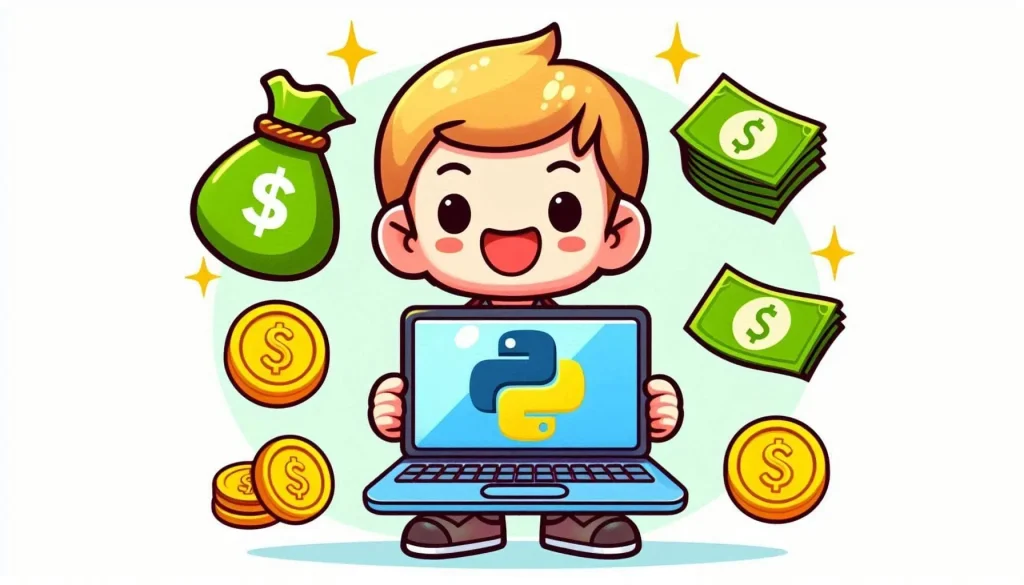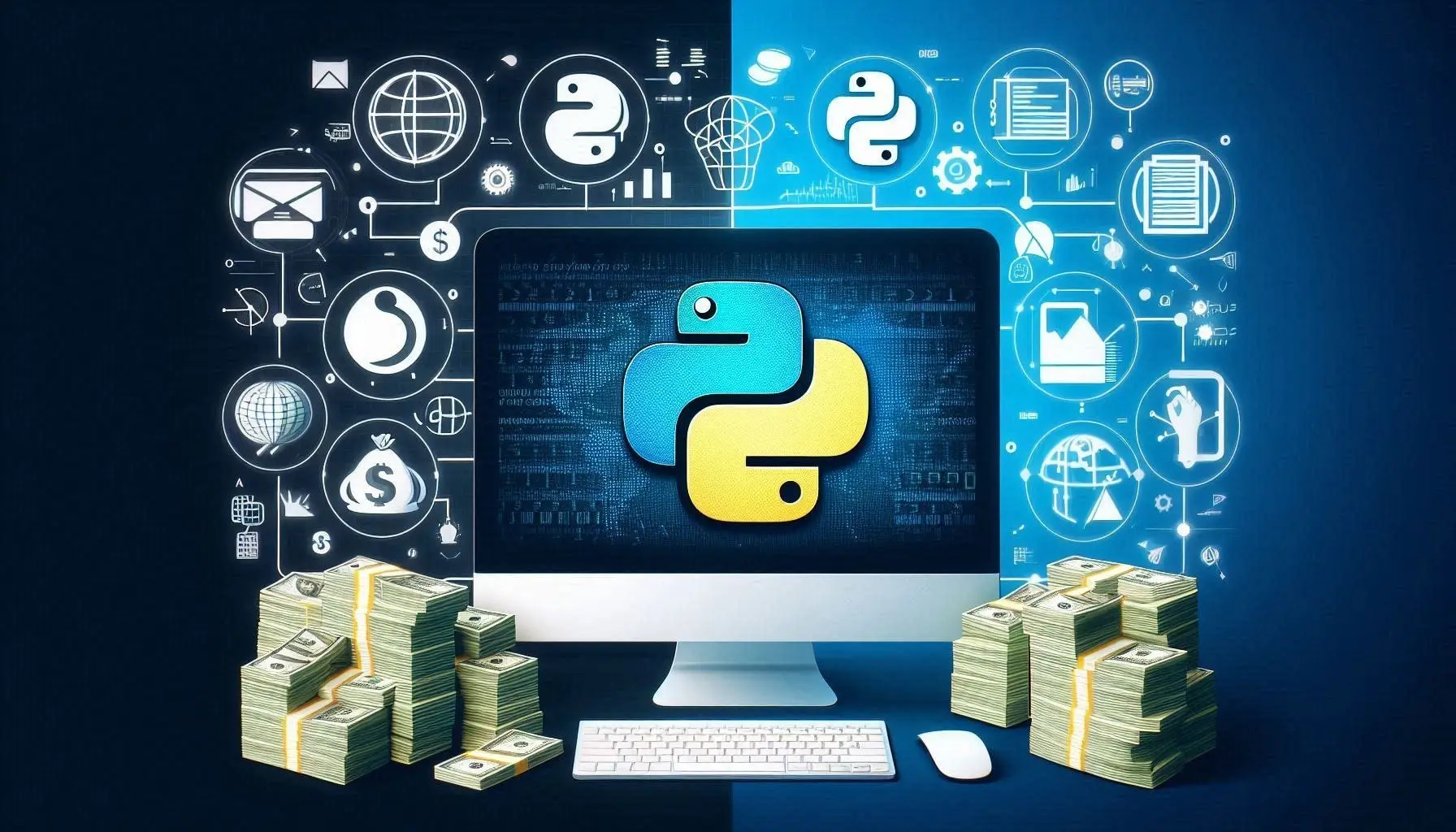Level up your income with Python! This versatile language unlocks high-paying careers in data science, web dev, and more. #Python #MakeMoneyCoding
In today’s dynamic tech landscape, Python has emerged as a powerhouse programming language, offering a lucrative path for developers. Making money with Python in 2024 is a reality for individuals with the right skill set and a strategic approach. This comprehensive guide explores why Python is a top choice, the essential skills for earning a living, and the various career paths you can pursue. We’ll delve into building a marketable portfolio, navigating the freelance scene, and securing high-paying Python jobs. Additionally, we’ll equip you with strategies for continuous learning and building a sustainable career beyond just the financial rewards.
Making Money with Python in 2024: A Lucrative Path for Developers
The demand for skilled Python developers is soaring across various industries. Here’s why Python stands out:
Why Python? The Powerhouse Programming Language
- Versatility Across Industries: Python is like a Swiss Army knife for programmers! It can be used for many things, from building websites to crunching numbers for science experiments. This makes it helpful for businesses of all kinds.
- Abundance of High-Paying Jobs: The Bureau of Labor Statistics projects a 13.3% growth rate for computer and information technology occupations between 2022 and 2032, much faster than the average for all occupations [1]. Python expertise positions you well to capitalize on this growth.
- Thriving Developer Community: Python boasts a vast and supportive developer community. This translates to readily available online resources, tutorials, and forums to help you learn, troubleshoot, and stay updated.
Getting Ready to Make Money with Python: Skills You’ll Need
Before you start using Python to make money, here are some important things to learn first:
- Mastering Core Concepts: Building strong Python programs is like building a sturdy house. It would be best if you had a solid foundation before you put up the walls and roof. Learning the basics of programming, like variables, data structures, how to control the program flow, and functions, is the foundation for Python.
- Building a Strong Data Science Foundation: “Data science is like finding hidden treasures in giant mountains of information. Python is the perfect shovel for this job, and libraries like NumPy, Pandas, and Matplotlib are like your special tools to sort, organize, and even create pictures to show off what you find!”
- Web Development Prowess with Frameworks like Django: Building websites is a big part of what programmers do, and Python makes it easier. Frameworks like Django are helpful toolkits that come with pre-built parts to save you time and make your website building smoother.
- Machine Learning Expertise: Imagine computers that can learn and improve on their own, just like people! That’s what machine learning is all about, and it’s changing the world in many ways. By learning libraries like sci-kit-learn and TensorFlow, you can build these smart systems using Python. These libraries are like toolkits that give you everything you need to teach computers to learn from data.
- Python is a whiz at making boring tasks automatic! Learning libraries like Selenium and Beautiful Soup let you build “mini-programs” that do those tasks for businesses, saving them a lot of time and effort.

Freelancing with Python is booming! Offer your data analysis or web scraping skills and watch the clients roll in. #PythonFreelance #GetThatGreen
Exploring the World of Python Jobs
With your Python skills honed, you can explore various career paths:
- Freelance Python Developer: Freelancing offers flexibility and control over your projects. You can work with diverse clients on various Python-based projects.
- Web Developer (Django, Flask): Web development is a vast field. Python frameworks like Django and Flask empower you to build user-friendly and interactive websites and web applications.
- Data Scientist & Machine Learning Engineer: These roles are in high demand, leveraging Python for data analysis, model development, and deployment.
- Automation Specialist: Businesses increasingly rely on automation to streamline processes. Your Python scripting skills can be invaluable in this area.
- Python Scripting for Businesses: Many businesses utilize Python for in-house tasks and data analysis. Offer your Python expertise to consult and develop custom scripts.
Creating Your Awesome Portfolio: Projects to Show Off:
A strong portfolio showcases your Python skills and problem-solving abilities to potential clients or employers. Here are some project ideas:
- Streamlining Data Analysis Tasks: Develop a Python script to automate data cleaning, analysis, and visualization for a specific dataset.
- Creating Custom Web Applications: Build a web application using a Python framework that addresses a particular need or solves a problem.
- Automating Repetitive Processes: Automate a tedious task using Python, such as web scraping data or managing social media posts.
- Developing Machine Learning Models: Train a machine learning model on a publicly available dataset to predict a specific outcome (e.g., stock prices, customer churn).
- Contributing to Open-Source Projects: Contributing to open-source Python projects demonstrates your skills and helps you build a network within the community.
Getting Noticed: How to Show Off Your Skills
Building a Strong Online Presence:
In today’s digital world, a strong online presence is essential. Here’s how to make yourself visible:
- Build a portfolio website: This is like a digital resume where you can show off your projects, what you’re good at (skills), and what you’ve done before (experience). There are free options like GitHub Pages, or you can build one yourself using Python tools.
- Join the Python community online: Talk to other Python users on places like LinkedIn, Twitter, and Stack Overflow. Share what you know, answer questions, and join discussions!
- Write about Python: Share your knowledge by writing articles or blog posts for websites that talk about tech stuff. This shows you’re an expert and helps more people find you.
Make your portfolio website awesome!
- Look good and easy to use: Keep it clean and professional, like a fancy resume online. Make sure it’s easy for people to find your projects.
- Show off your Python skills: Tell everyone what you’re good at with Python, like special tools (libraries) or ways to build things (frameworks).
- Pick your best projects: Show projects that use all your different Python skills and how you solved problems. Briefly explain what each project did, what it can do now, and what tools you used.
- Get good reviews (optional): If you’ve worked with others (freelancing), ask them to say nice things about your work on your website. This makes your skills seem even more awesome!

Make connections and find Python jobs!
1. On LinkedIn:
- Spruce up your profile: Make sure it shows off your Python skills and experience. Use words people who hire programmers might search for (keywords).
- Grow your network: Connect with other Python programmers, people who might hire you (clients), and folks who work in your field (industry professionals).
2. On GitHub:
- Show off your coding: Help out with other people’s projects on GitHub (open-source projects). This shows you’re good at coding and like to work with others.
3. Freelancing (optional):
- Upwork & Fiverr: These websites can help you find freelance work.
- Make a great profile: Show off your Python skills, highlight your best projects, and set fair prices.
- Win projects: Read what people need carefully and explain how your skills can help them.
- Be a great freelancer: Do good work, finish on time, and talk clearly with clients to build a good reputation.
Be your boss with Python!
Freelancing lets you set your hours and choose the projects you work on. Here’s how to make it work:
- Identifying Profitable Niches: Specialize in a particular area of Python development, such as data science, web scraping, or automation. This allows you to attract clients seeking specific expertise.
- Creating Compelling Client Proposals: Craft proposals that clearly outline your understanding of the project, your proposed approach, and a realistic timeline. Showcase your value proposition and convince clients you’re the best fit for the job.
- Mastering the Art of Negotiation: Be confident when negotiating your rates. Research industry standards and factor in your experience and skills when setting your pricing.
- Delivering Exceptional Client Service: Prioritize clear communication, meet deadlines consistently, and go the extra mile to exceed client expectations.
- Building Long-Term Client Relationships: Develop strong relationships with satisfied clients to secure ongoing projects and referrals.
Not just freelancing: More awesome Python jobs!
Freelancing is cool, but there are other great Python jobs out there too! Let’s explore some options.
- Refining Your Resume for Python Roles: Tailor your resume to highlight your Python skills and accomplishments. Use action verbs and quantifiable results to showcase the impact of your work.
- Mastering Job Interview Techniques: Prepare for common Python developer interview questions by practicing coding challenges and brushing up on your technical knowledge. Research the company and the specific role to tailor your answers.
- Highlighting Python Skills and Achievements: During interviews, confidently discuss your Python projects, the challenges you tackled, and the solutions you implemented. Quantify your achievements using metrics whenever possible (e.g., “Increased efficiency by 20% through automation”).
- Negotiating Your Worth in the Job Market: Do your research to understand the average salary range for Python developers with your experience level and location. Be prepared to negotiate your salary with confidence based on your skills and market value.
Never stop learning awesome Python stuff:
The world of Python keeps growing and changing. Here’s how to stay on top of it:
- Keep practicing: The more you use Python, the better you’ll get.
- Try new things: Don’t be afraid to tackle new Python projects or learn new libraries.
- Follow the experts: Read blogs, watch videos, or join online communities to learn from other Python programmers.
Keep your Python skills sharp!
The world of tech is always changing, and Python is no exception. Here’s how to stay on top of your game:
- Learn new things: Don’t be afraid to experiment with new Python projects and libraries. There’s always something cool to discover!
- Follow the brainiacs: Read blogs, watch videos, or join online groups to learn from other Python programmers.
- Hot tech alert! Stay in the know about cutting-edge stuff like Artificial Intelligence (AI) and Blockchain. Python has special tools (libraries) like TensorFlow for AI and Hyperledger Fabric for Blockchain to help you learn these too!
- Join the Python party online: Chat with other programmers in online forums and communities. You can learn from each other, find solutions to problems, and hear about the latest trends.
- Conferences and workshops (optional): These can be a great way to learn new things and meet other experts in the field.
- Online courses can help: There are tons of online courses and certifications available to help you fill any knowledge gaps and reach your career goals.
- Be your own teacher too: Set aside time to explore online resources, tutorials, and guides on your own. This is a great way to keep learning and discover new Python tools (libraries and frameworks).
Finding a Python Job You Love !!
Money is important, sure, but wouldn’t it be awesome to find a Python job that keeps you happy and fulfilled too? Here’s how to find that perfect fit:
What lights you up? Think about what you enjoy doing with Python. Do you love working with data? Building websites? Automating tasks? Figuring out this will help you find jobs that use your favorite Python skills.
Work-life balance matters: Make sure the job offers hours and flexibility that work for you. You want a job that lets you enjoy your life outside of work too!
Find a company culture you dig: Do you like working in a team environment or on your own? Do you prefer a casual or formal atmosphere? Knowing what kind of company culture you like will help you find a good fit.
Keep learning is key! Look for a job that lets you keep learning new things and growing your Python skills. That way, you won’t get bored and you’ll stay excited about your work.
- Work-Life Balance for Python Developers: While Python development can be demanding, maintaining a healthy work-life balance is crucial. Set boundaries, prioritize your well-being, and avoid burnout.
- Make learning Python fun!: Think about what you like doing with Python. Is it solving puzzles? Building cool things? Once you know what’s fun, you can find projects you’ll love working on.
- Make Python friends and help others! Being a Python programmer isn’t all about working alone. Here’s why making friends with other programmers is awesome.
- Teamwork makes the dream work: Collaborate on projects with other programmers. You can help each other out and build some really cool stuff together!
- Share what you know: Once you’re a Python pro, help others learn too! You can answer questions online, mentor someone new, or even create a project that everyone can use (an open-source project). This is a great way to give back to the Python community and make it a more friendly place for everyone.

Common Challenges and How to Overcome Them
Even the most skilled Python developers face challenges. Let’s explore some common hurdles and how to overcome them:
- Sometimes even smart programmers feel like they’re not good enough, even when they are! This is called “Imposter Syndrome.” Don’t let it get you down. Focus on the cool things you’ve already built with Python, celebrate how far you’ve come, and remember everyone good at something started by learning the basics.
- Hearing “no” can be a bummer, but it happens to everyone, even when looking for freelance work or a new job with Python. Don’t let it stop you! Learn from each experience, try a new approach next time, and keep at it. You’ll find the perfect fit eventually!
- Using Python can be so much fun, but it’s important to take care of yourself too! Set goals you can reach, celebrate your wins along the way, and take breaks to avoid feeling burned out. Keeping a healthy balance between work and your personal life is key!
- It’s important to find a good rhythm between using Python for work and having fun outside of it! Set clear times for work and personal life. If you can, share some of your tasks with others. Most importantly, take care of yourself! Don’t let work take over all your free time.
“Python is the new gold rush!” – overheard at a tech conference. Time to dust off those coding skills, y’all! #PythonJobs #FutureProofCareer
Conclusion: Making Money with Python in 2024 – Your Journey to Success
Making money with Python in 2024 is a promising path for individuals with the right skills and dedication. By honing your Python expertise, building a strong portfolio, and continuously learning, you can position yourself for success in a high-demand field. Remember, the journey is just as important as the destination. Embrace the learning process, connect with the Python community, and build a sustainable career that fuels your passion for coding and problem-solving. With hard work and dedication, you can turn your Python skills into a lucrative and fulfilling career.

FAQs: Making Money with Python in 2024
Q: What are some in-demand Python skills for making money?
A: In-demand skills include data analysis (libraries like NumPy, Pandas, Matplotlib), web development (frameworks like Django, Flask), machine learning (sci-kit-learn, TensorFlow), automation (Selenium, Beautiful Soup), and familiarity with cloud platforms (AWS, Google Cloud Platform, Microsoft Azure).
Q: Is freelancing a good option for beginners with Python?
A: Freelancing can be a viable option, but it requires strong self-marketing and business management skills. Beginners may benefit from gaining experience through internships or entry-level jobs before venturing into freelancing.
Q: How much can I earn as a Python developer?
A: Salaries vary depending on experience, location, and specialization. According to Indeed, the average base salary for Python developers in the US is $114,527 [2]. However, salaries can range from $70,000 to $180,000 or more for highly skilled developers.
Q: Are there any resources available to help me learn Python for free?
A: Absolutely! There are numerous free online resources to learn Python, including tutorials, courses, and documentation. Websites like W3Schools, Coursera, edX, and the official Python website offer a wealth of free learning materials.
Q: What are some tips for building a strong Python portfolio?
A: Here are some tips:
- Focus on quality over quantity. Showcase projects that demonstrate your diverse skills and problem-solving abilities.
- Include clear descriptions for each project, outlining the goals, functionalities, and technologies used.
- Make your portfolio visually appealing and user-friendly. Ensure easy navigation for visitors to explore your work.
- Consider incorporating code snippets or interactive elements to showcase your coding skills in action (if applicable).
By following these tips and the guidance outlined in this comprehensive guide, you can embark on your journey to making money with Python in 2024. Remember, the key lies in continuous learning, building a strong skillset, and actively engaging with the vibrant Python developer community. With dedication and perseverance, you can turn your passion for Python into a successful and rewarding career.
